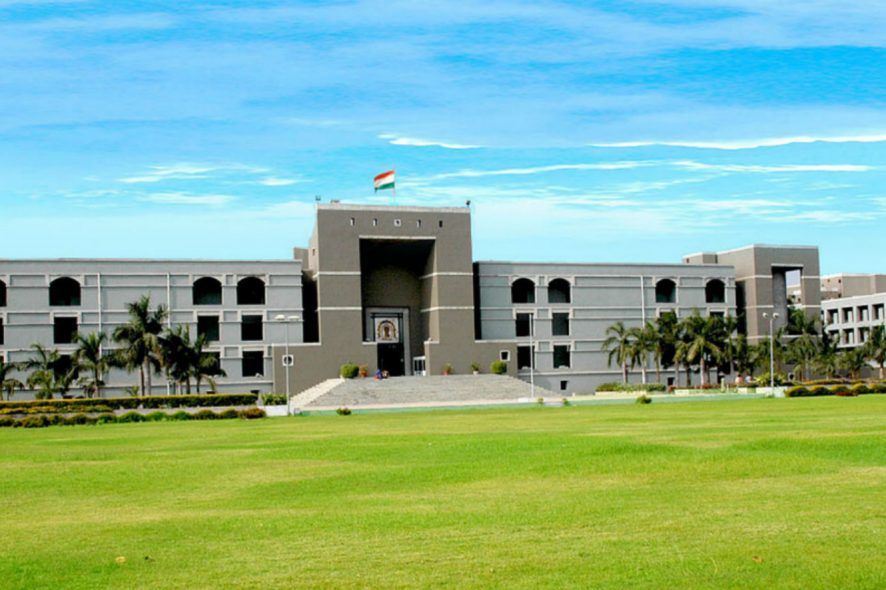Gujarat High Court: A Division Bench of Bela M. Trivedi and A.C. Rao, JJ., dismissed an appeal filed on being aggrieved by the Judgment and order by the Additional Sessions Judge and Special Judge (POCSO), whereby it had convicted the appellant-accused for the offence under Sections 302, 363, 366, 376AB, 377 and 201 of the Penal Code, 1860 and under Sections 3(a), 4, 5(a), 5(r) and 6 of the Protection of Children from Sexual Offences Act, 2012, and had sentenced him to death penalty for the offence under Sections 302, 376AB of the Penal Code and had convicted him of the offences under the Atrocities Act.
The facts of the case stated as per the prosecution before the Special Court were that the appellant-accused was residing on the ground floor of the house owned by Shyam Narayan Pandey and the complainant along with his family had been residing in the same building on the first floor as a tenant and the appellant on 14-10-2018 between 8-8.30 pm kidnapped his minor daughter aged about 3 years and 6 months (victim) took her to his room committed rape on her and killed her by throttling. Thereafter in order to destroy the evidence put the body of the victim in a gunny bag in his room and locked the room from outside and fled away. After the complainant filed the missing report in the police station the investigation officer conducted an inquiry and since the room of the accused was locked the lock was broken and the body of the victim was found in a decomposed state. After collection of sufficient evidence against the accused the charge-sheet was filed before the Special Court. After appreciating the evidence on record, it convicted and sentenced the accused as per the impugned judgment and order which is challenged in the instant petition.
The counsel for the appellant-accused Radhesh Vyas stated that the whole case of the prosecution was rested on the circumstantial evidence, the confession made by the before medical examiner as well as when in police custody could not be relied upon and read as evidence, the CCTV footages provided did not cover the entire area of the society and couldn’t be termed as reliable piece of evidence, relying upon the cross-examination which submitted that there was a shutter in the room of the accused and possibility that the gunny bag could be placed through that shutter cannot be ruled out. Lastly relying on the Supreme Court judgment of Bachan Singh v. State of Punjab, (1980) 2 SCC 684 and Machhi Singh. v. State of Punjab, (1983) 3 SCC 470 he submitted that the Special Court had committed a gross error in not considering the mitigating circumstances before awarding capital punishment and relying on various other cases he tried to establish that the instant case did not fall in the category of the rarest of the rare case.
The counsel for the respondents Himanshu Patel, stated that even if the case was based on circumstantial evidence the prosecution had proved each and every circumstance without reasonable doubt proving guilt of the accused and wile at the time of the investigation he did not cooperate with it and had fled to his village the next morning of the incident and the investigation officer had found the body of the victim from his room, the postmortem reports clearly described that the victim was raped in a diabolical manner and brutally murdered by strangulation and then her dead body was kept in a gunny bag to decay and decompose. Late the accused was arrested from Bihar in a train going to Delhi. The DNA profile and other scientific investigations also proved that the accused was involved with the crime. The Court, therefore, had no hesitation in holding that trustworthy and credible evidence given by the prosecution had conclusively proved the guilt of the appellant/accused, excluding any possibility of his innocence.
The Court while dismissing the appeal and confirming the decision of the Special Court stated that the abhorrent and atrocious nature of crime committed by the appellant-accused in a diabolical manner, on the defenseless unprotected girl of 3½ years, without any remorse, has left the Court with no option but to consider the case as the “rarest of rare case” for awarding the punishment of death penalty. [Anil Surendrasingh Yadav v. State of Gujarat, 2019 SCC OnLine Guj 2692, decided on 27-12-2019]






